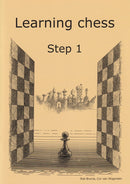Description
Learning Chess Workbook: Step 1 - Rob Brunia & Cor Van Wijgerden
paperback, 56 pages
ISBN: 90-77275-13-9
The step-by-step method has been developed by Rob Brunia and Cor van Wijgerden to teach children to play chess. A large number of schools and chess clubs in the Netherlands, Belgium, Germany, Switzerland and Austria use this method for their chess lessons.
This method consists of six steps. Each step is accompanied with an instruction book with the teaching material to be used by the trainer / teacher / parent and a workbook with exercises for the students.
Step 1
In the first stepall the rules of the chess game are introduced. Furthermore, much attention is paid to developing of the basic skills, necessary to play chess. Comparing with other books for beginners the step-by-step method introduces an unique sequence of the teaching material.
Learning how to mate is postponed as long as possible. This sounds astonishing and even incredible but up till now, practice has shown that this approach works perfectly. Children learn to play chess very well, for sure if they get enough time in between to play and practice.
The 'first step' consists of a manual for the trainer and workbooks for the students: step 1, step 1 extra and step 1 plus. There are special books available for children from 6 till about 9 years old: the stepping stones.
Workbook Step 1. In addition to the exercises there are reminders in the workbook. These are short recapitulations of the lessons in the manual for the pupils. There are 13 reminders:
- The board
- Moves of the pieces
- Attacking and capturing
- The pawn
- Defending
- Check and getting out of check
- Mate
- Castling
- Exchange and profitable exchange
- Twofold attack
- Draw
- The pawn (2)
- The notation
On the remaining 42 pages there are always 12 positions a page. That means a total number of 42x12-18 (the drawings) = 486 positions.
paperback, 56 pages
ISBN: 90-77275-13-9
The step-by-step method has been developed by Rob Brunia and Cor van Wijgerden to teach children to play chess. A large number of schools and chess clubs in the Netherlands, Belgium, Germany, Switzerland and Austria use this method for their chess lessons.
This method consists of six steps. Each step is accompanied with an instruction book with the teaching material to be used by the trainer / teacher / parent and a workbook with exercises for the students.
Step 1
In the first stepall the rules of the chess game are introduced. Furthermore, much attention is paid to developing of the basic skills, necessary to play chess. Comparing with other books for beginners the step-by-step method introduces an unique sequence of the teaching material.
Learning how to mate is postponed as long as possible. This sounds astonishing and even incredible but up till now, practice has shown that this approach works perfectly. Children learn to play chess very well, for sure if they get enough time in between to play and practice.
The 'first step' consists of a manual for the trainer and workbooks for the students: step 1, step 1 extra and step 1 plus. There are special books available for children from 6 till about 9 years old: the stepping stones.
Workbook Step 1. In addition to the exercises there are reminders in the workbook. These are short recapitulations of the lessons in the manual for the pupils. There are 13 reminders:
- The board
- Moves of the pieces
- Attacking and capturing
- The pawn
- Defending
- Check and getting out of check
- Mate
- Castling
- Exchange and profitable exchange
- Twofold attack
- Draw
- The pawn (2)
- The notation
On the remaining 42 pages there are always 12 positions a page. That means a total number of 42x12-18 (the drawings) = 486 positions.
Payment & Security
Your payment information is processed securely. We do not store credit card details nor have access to your credit card information.


